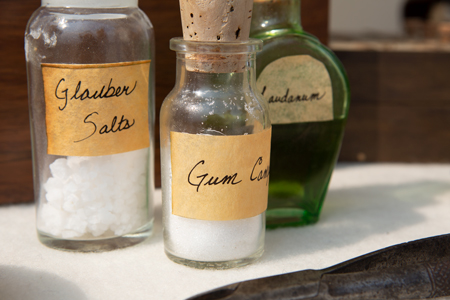Before departure, the red pirogue‘s rudder must be repaired. Lewis describes empty Indian hunting camps and treats Pvt. Joseph Field with salts and opium. On their way to evening camp east of present Wolf Point, Montana, Lewis reports seeing vast herds of bison along with some elk and pronghorn.
Lewis Doctors Fields
by Yellowstone Public Radio[1]Originally aired weekdays by Yellowstone Public Radio during the Bicentennial observance of 2003-2006. Narrated by Hal Hansen. Scripts by Whit Hansen and Ed Jacobson. Produced by Leni Holliman. © … Continue reading
Glauber Salts and Laudanum
Historical interpretation by John W. Fisher and staged by the Lewis and Clark Honor Guard of Great Falls, Montana. Photo © 2017 by Kristopher K. Townsend. Permission to use granted under the Creative Commons Attribution-Share Alike 4.0 International license.
Repairing the Red Pirogue
We were detained this morning untill about 9 OCk. in order to repare the rudder irons of the red perogue which were broken last evening in landing; we then set out, the wind hard against us.
—Meriwether Lewis
Vast Herds
I saw immence quantities of buffaloe in every direction, also some Elk deer and goats [pronghorns]; having an abundance of meat on hand I passed them without firing on them; they are extreemly gentle the bull buffaloe particularly will scarcely give way to you.
—Meriwether Lewis
Indian Hunting Camps
passed several old Indian hunting camps in the course of the day one of them contained two large lodges which were fortifyed with old driftwood and fallen timber
—Meriwether Lewis
Treating Joseph Field
Joseph Fields was very sick today with the disentary had a high fever I gave him a doze of Glauber salts, which operated very well, in the evening his fever abated and I gave him 30 drops of laudnum.—
—Meriwether Lewis
Weather Diary
State of thermometer at rise
Weather Wind at rise
State of thermometer at 4 P. M. Weather Wind at 4 P. M. State of the river 38 [above 0] cloudy W. 48 [above 0] fair after cloudy W. the black martin makes it’s appearance. the snow has disappeared. saw the first grasshoppers today.— there are great quantities of a small blue beatle feeding on the willows.—
—Meriwether Lewis[2]To assist the reader, the editor of this web page has omitted the date column, merged the “State of the river” columns, and spelled out some abbreviations.
Experience the Lewis and Clark Trail
The Lewis and Clark Trail Experience—our sister site at lewisandclark.travel—connects the world to people and places on the Lewis and Clark Trail.
Plan a trip related to May 4, 1805:

Notes
| ↑1 | Originally aired weekdays by Yellowstone Public Radio during the Bicentennial observance of 2003-2006. Narrated by Hal Hansen. Scripts by Whit Hansen and Ed Jacobson. Produced by Leni Holliman. © 2003 by Yellowstone Public Radio. |
|---|---|
| ↑2 | To assist the reader, the editor of this web page has omitted the date column, merged the “State of the river” columns, and spelled out some abbreviations. |

